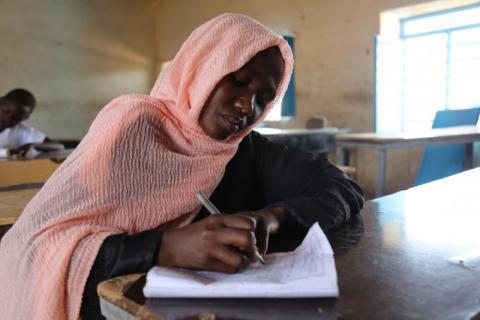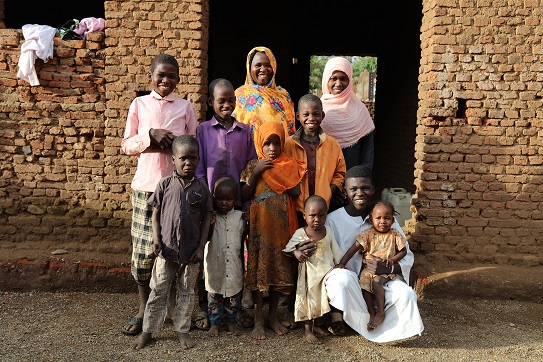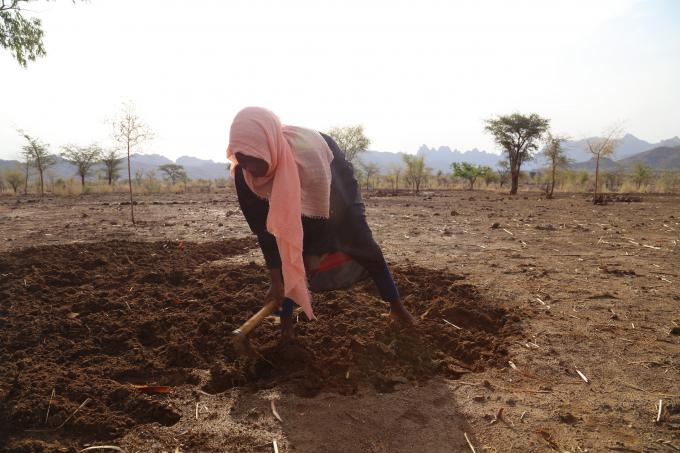يدعم مشروع في التعليم في حالات الطوارئ الأطفال للعودة إلى المدرسة بعد سنوات من النزوح | Education in Emergencies supports children in going back to school after years of displacement

"عمري 16 عامًا وولدت في نوفمبر 2005. أذهب إلى المدرسة في الصف الثامن.
Hanan, 16:
"I am 16 years old and was born in November 2005. I attend school and I am in the 8th grade.
My family was already displaced from our town to another village when I was 5 years old. Then during the last fighting in 2016, we were displaced again. At that time, I was around 10 years old.
We left our house because my uncle had heard that our village will be attacked. He called my mother and said that we have to move immediately. Shortly after we left, they came and bombed the place. Our house and belongings were all completely destroyed. We walked for one month to reach there. During this time, my legs were damaged; they still hurt sometimes.
We only came back to my hometown last year. During the second displacement, I did not go to school for four years. My parents want me to go to school so that I can have a future, but it is difficult for them in these circumstances. My parents cannot buy us more than one notebook each per year. If we fill up the pages, we have to wait until the next year. Their income is too low.
My father has a small shop in the market and my mother is a farmer. We do not have much money. Sometimes, it is difficult for my parents to feed all my brothers and sisters. We are 7 boys and 4 girls in our family: 11 children. On a regular day, we eat only twice and we can only afford Asida (traditional porridge) and lentils.

It is difficult with so many children. How can we live? How can we eat?
I love going to school. We have English, Arabic, science, history, applied technical, Holy Quran and math. My favorite subject is Arabic because I want to be educated. My parents want that all of us receive a good education, even though my father only went to Quran school and my mother never visited a school. I think they were inspired by one of our neighbors who is very educated.
My dream is to become a teacher one day. My dream is small because, in these circumstances, I cannot have bigger dreams.
Golo is my hometown, and I prefer to stay here. I don’t want to live in another place.
The school quality here is good, better than the school I visited when I was younger. Here, the teaching is different. When the teachers receive materials through the project, they can explain better. We also have enough tables and benches here. I understand the teachers much better. If I could wish for something, I would like to have more trees in the schoolyard and a fence around the school. The wall would stop the animals from entering and eating the trees.

Every day, I have to help my mother with farming. We grow millet, okra, and tomatoes. I prefer going to school, rather than working on the farm. Yet, in school I can learn a lot of things, it even helps me to farm better. We learned about fertilizers, and we learned that, for example, if you cultivate under a tree, the plants will not grow as well. Now, I can also apply that when I am in the farm."
The Education in Emerhencies project, overall, aims for the provision of safe, inclusive, uninterrupted, and quality education to conflict-affected and other vulnerable boys and girls. We also operate in West Darfur, White Nile and Blue Nile states of Sudan.
The project aims to strengthen community participation and ownership of children's education ensuring protection, resilience and improved learning outcomes. We are working with and through the local partners to also prioritize emotional and psychosocial protection, physical protection (Safe Schools), teaching and learning (Literacy Boost in Emergencies - LBiE) parents, community participation and school leadership and management. We prioritize bringing back to school out of school boys and girls who have not been attending school due to variety of reasons, namely conflict.
 Sudan
Sudan